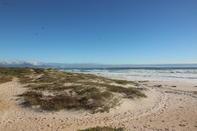Development Decisions

Managing a coastline, in the context of sea level rise, needs a flexible, holistic approach, beyond that offered by the usual cost-benefit analysis, which relies on a narrow ‘actuarial’ or insurance industry measure of the value of a piece of land.
Development decisions need to be made on a case by case basis. While a ‘multi-criteria’ approach is a subjective assessment process, it allows for City managers to learn, adapt and respond appropriately to the changing context of the coast, and to sea behaviour. Some key criteria when deciding on how to manage coastal development applications and adaptive interventions include:
How much does it increase or reduce risk?
Is it easy to implement?
Are there any additional benefits that are not linked to sea level rise risk management or climate change adaptation?
Are there any unintended negative consequences?
What is the cost, relative to reducing the impact per unit of investment?
What are the greenhouse gas emissions (eg, large volumes of concrete, or energy used to pump water) associated with the choice?
Given the unpredictable nature of a climate-altered future, is the development reversible and flexible to respond as our knowledge grows?
Complementary options are better than single solution approaches.
An intervention must not transfer risk onto poor communities, since these are already less able to absorb environmental shocks than affluent communities.
Responsible Management

Responsible coastal management allows for more than just building development.
Nature heals itself - careful dune management, natural sand replenishment, wetland restoration, and so forth.
This is our heritage - recognising the social and cultural heritage value of our coasts, which is difficult to quantify or give a monetary value. Coastlines must be accessible to more than just those with economic or political power, and they must be protected beyond the needs of the current generation.
Win some, you lose some - there will be winners and losers, no matter what decisions are made, but these contests need to consider issues of equity and power differences within society. There will often be conflict between public and private interests.